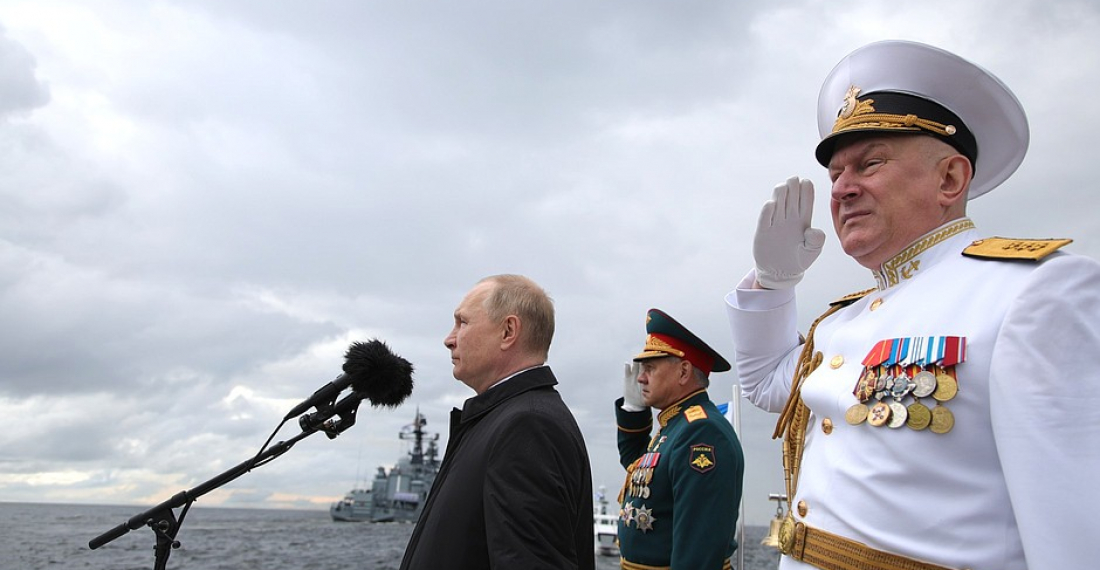Russian president Vladimir Putin has signed the new doctrine of the Russian Navy. The Doctrine outlines the boundaries and areas of the country’s national interests, Putin said before reviewing ships at the annual Main Naval Parade in St. Petersburg on Sunday (31 July).
"Russia’s new Maritime Doctrine has been approved. We openly designated the boundaries and areas of Russia’s national interests, both economic and vital strategic areas. First of all, these are our Arctic waters, the waters of the Black, Okhotsk and Bering Seas, the Baltic and Kuril straits. We will firmly provide for their protection by all means," Putin stressed.
Putin said, "the Navy’s capabilities are a key word here." "It is capable of swiftly counteracting all those who will venture to encroach on our sovereignty and freedom and accomplishes strategic tasks successfully and with honour on our country’s frontiers and in any part of the World Ocean," he said.
The latest developments require Russia’s adequate and decisive actions, the Russian president added.
"The present-day conditions require that we take adequate, prompt and decisive actions. I am certain that the current generation of sailors and officers is the Fatherland’s reliable and enduring support. For all of us, the Motherland is a sacred notion and its protection is the lofty duty and the essence of life for each of us," Putin emphasized.
The delivery of the cutting-edge Tsirkon hypersonic missile systems to the Russian Armed Forces will begin in the coming months and the frigate Admiral Gorshkov will be the first carrier of these formidable weapons, Putin said, emphasising that the Russian Navy is constantly improving its armaments.
"It will suffice to mention the latest and world’s unrivaled Tsirkon hypersonic missile systems, for which no obstacles exist," the Russian leader stressed. "Their delivery to the Russian Armed Forces will begin in the coming months. The frigate Admiral Gorshkov will be the first to assume combat alert with these formidable weapons on board. The area of the operation of this warship outfitted with the Tsirkon hypersonic missiles will be chosen proceeding from the interests of ensuring Russia’s security," Putin said.
The new Doctrine of the Russian Navy
The new Doctrine of the Russian Navy has now been posted on the web portal of the Russian government.
"The major challenges and threats to the national security and the sustainable development of the Russian Federation related to the World Ocean are: the US strategic course towards dominance in the World Ocean and its global influence on international processes, including those related to the use of transportation lanes and energy resources of the World Ocean," the document says.
The new doctrine also identifies the expansion of the NATO military infrastructure to the Russian borders and the growing number of the military bloc’s drills in the seas adjacent to Russian territory as major security threats.
The new doctrine points to the attempts by the United States and its allies to limit Russia’s access to the World Ocean’s resources and vitally important sea transportation lanes and the US desire to achieve the overwhelming supremacy of its Navy.
Russia’s new Maritime Doctrine stipulates stepping up activities in the Arctic, the document suggests.
"The new doctrine envisages "diversifying and stepping up maritime activity on the Spitsbergen, Franz Josef Land and Novaya Zemlya archipelagoes and Wrangel Island," the document says.
Russia will be ramping up the Navy’s operational capabilities to ensure national security and protect its interests in the World Ocean, as follows from the new Maritime Doctrine.
"The strategic goals of the national maritime policy are as follows: raising the Navy’s operational (combat) capabilities for ensuring national security of the Russian Federation and protecting its national interests in the World Ocean," the document says.
Another strategic objective is to raise the efficiency of defending and protecting the state maritime borders of the Russian Federation, the document says.
Russia’s new Maritime Doctrine stipulates developing the shipbuilding industry in the Far East, in particular, for building aircraft carriers, as follows from the document.
"Developing a modern, hi-tech shipbuilding industry in the Far East designed for building large-tonnage vessels (in particular, for the Arctic’s development) and advanced aircraft carriers for the Navy," the document reads.
NATO’s expansion to Russian borders is unacceptable in Moscow’s relations with the military bloc, as follows from the new Maritime Doctrine.
"NATO’s plans of moving its military infrastructure close to the Russian borders and the alliance’s attempts to assume global functions continue to be unacceptable for the Russian Federation and remain a determining factor in its relations with NATO," the document reads.
As the doctrine specifies, Russia’s national maritime policy in the Atlantic region is shaped taking into account the existence of NATO whose activity "is aimed at direct confrontation with the Russian Federation and its allies."
Source: commonspace.eu with TASS news agency (Moscow) and other media outlets






